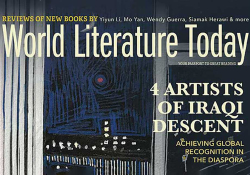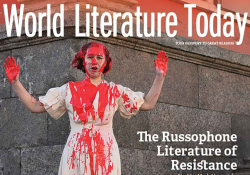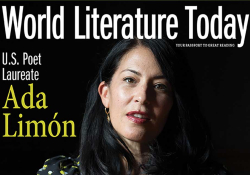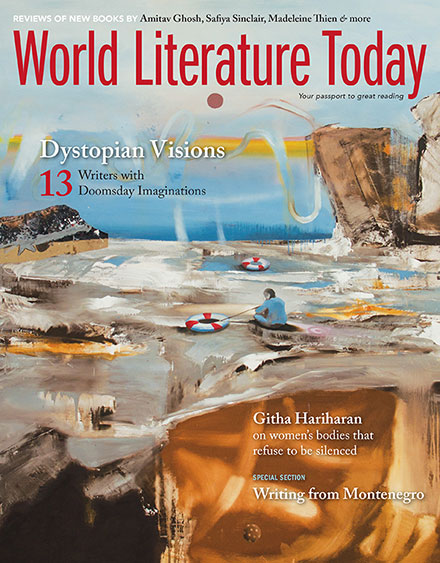Editor’s Note
 How could utopia fail?
How could utopia fail?
– Elizabeth Fifer, “Dead Reckoning”
In László Krasznahorkai’s 1989 novel, The Melancholy of Resistance—published the same year Hungarian communism collapsed and the Berlin Wall fell—“crowds rampage, hypnotized by the chirping of a shrunken puppet-man sitting in front of a rotting whale.” In 2016, months before the US presidential election, Cuban writer Yoss imagined “the division of the United States into two dozen small nations, after Donald Trump’s second term.” The autocrat in Egyptian novelist Basma Abdel Aziz’s story “deleted words that society no longer needed, like ‘elect,’ and introduced new terms of great importance, which outlined groundbreaking ways of being patriotic that no one had considered before.” For Japanese poet Kiriu Minashita, “Even while boasting of its rapid strength and speed, the world is being ecstatically eroded by the violent rewriting of meaning.” And the rat and louse in Mexican writer Yuri Herrera’s story “The Objects” live a tenuous, shape-shifting existence in a collapsing building from which they push “the bosses” over the ledge on the top floor.
Dystopian visions of the future abound in this issue’s cover feature, which begins on page 42. In 2017, when the line between truth and fiction seems more tenuous than ever, wouldn’t it be best to eschew speculative fiction in order to sort out present truth once and for all? As the writers in our cover feature repeatedly insist, however, the literary imagination is more urgent than ever. Literature “reflects, comments on, and predicts our social realities,” South African writer Michelle Pretorius tells Maggie Messitt: “The world created by speculative fiction is so far removed from our reality that we have to pause and actively consider the rules of this world as well as the commentary it is making about our society.” That is, rather than mere escapism, the literature of dystopia imagines the darkest possible futures that await humanity if we persist in our hubris, avarice, and violence. In his interview with David Shook, Yoss observes: “Science fiction is a literature of responsibility for the future consequences of our present actions, among other definitions. So we continue depicting dystopias and begging in our minds that they never become real.”
While Thomas More’s Utopia (1516) famously imagined a “nowhere” island as an ideal polis with its own alphabet, British philosopher John Stuart Mill is credited with coining the antonym in an 1868 speech to Parliament in which he railed against the British government’s Irish land policy: “It is, perhaps, too complimentary to call them Utopians, they ought rather to be called dys-topians, or caco-topians. What is commonly called Utopian is something too good to be practicable; but what they appear to favour is too bad to be practicable” (Oxford English Dictionary). As I write this in late January 2017, droves of readers in the US are turning to dystopian novels by H. G. Wells, John Steinbeck, Sinclair Lewis, Aldous Huxley, and Ray Bradbury, with George Orwell’s 1984 at the top of the Amazon best-seller list. As Dante proved, hell is a much more interesting place than heaven in the literary imagination.
Yet the real world always tries to elbow its way back in. “It isn’t a hell,” Yoss continues, “but, without doubt, it is pretty far from being the best of all possible worlds. A dystopia of deception, perhaps, where life isn’t so bad . . . but there’s not much notion of truth.” He might be describing Cuba, but Yoss imagines a world uncannily like the one we live in today, where rhetoric flays truth, and hell seems to lie just around the corner.
Despite such darkness, we are pleased to present a mini Republic of Letters in the following pages, where all languages are welcome, and no travel bans exist.
Daniel Simon










